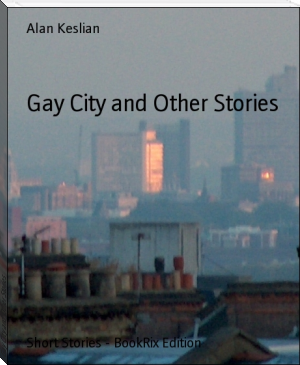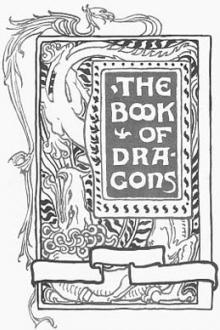Gay City and Other Stories - Alan Keslian (book recommendations based on other books .TXT) 📗

- Author: Alan Keslian
Book online «Gay City and Other Stories - Alan Keslian (book recommendations based on other books .TXT) 📗». Author Alan Keslian
‘If you were the last person on earth I wouldn't help you,’ she said when I rang her. ‘You are a Neanderthal, a chauvinist, an atavistic retard, and like all men you are the product of a defective gene.’
‘I admit all that,’ I replied. ‘What I have in mind is a straightforward swap. If you will support my protegé, I will return the favour if ever you wish to nominate someone.’
‘Whosoever I choose?’
‘Precisely.’
Her signature arrived in the post the next day; my new friend's ambition was realised. He attended the dinner at which his appointment was to be announced. Members and their guests sat in allocated seats at long tables, the knives and forks of their place settings geometrically arranged. Wine glasses sparkled under gilded chandeliers. After the meal the guest speaker rose to give the address, as usual a compilation of familiar platitudes and worthless congratulations.
I could stand it no longer, I had to do something. I sought out my new friend and said, ‘It has occurred to me that you are newest member of The Committee, and I am the longest serving. We should have our photograph taken together.'
We presented ourselves to the photographer, and he had us pose in front of a curtain. As he was about to take the shot, I turned rapidly towards my protegé and kissed him fully and firmly on the lips. With age my face has increasingly come to resemble that of an ancient tortoise; the contact cannot have been a pleasant experience for him. For a moment he was too shocked to react. In my most pompous old fool's voice I said: 'That is my blessing.'
Then, infuriatingly, turning back towards the photographer again, I saw that he had abandoned us. At the crucial moment, instead of taking a picture of the outrageous kiss, he was called away to the assistance of an old fool who had dozed off in his chair, allowing his head to fall into his pudding. I turned back to my gay friend, expecting him to accuse me of assault, call for help, or knock me down. Instead he was looking at me with a bemused smile.
‘Sorry, I really wasn’t expecting that kiss. You left me gob-smacked in more ways than one. Don’t think me ungrateful for all your help. I would not be here at all without it. Thank you for everything.’
My mutinous hopes of being the subject of scandal in the morning’s papers evaporated. As for my fellow Committee members, there was no hint of outrage; predictably they seemed not to have noticed. They were too busy gazing blankly into space or retelling the anecdotes they retold at every ceremonial dinner. None of them was likely to inform journalists of my performance. Even my enemies continued to ignore me!
As my protegé and I were returning to our seats the Chairman approached us. ‘I’m glad I’ve found you two together. I’ll be telephoning the two of you tomorrow. I'm setting up a small team to review The Committee’s rules and constitution.’
When she was out of earshot again I said to him: ‘Oh my god, not grinding through the interminable rules and constitution, we’ll suffocate.’
‘Oh come on, it’s an essential first step. Who else could she ask?’
The Gay Bequest Trust
On the day of the funeral Felicity drove down from the West Midlands to London. Her mother, Elaine, had travelled up from Crawley, and they met at Victoria Station. They already knew the contents of the will; they and one or two other relatives would receive a small legacy, with the remainder of the estate going to charity. Elaine expressed her disappointment: 'Of course it doesn't matter to your father and I, we're too old for money to make much difference to us now. But for you – well, he could have put an end to all of your money worries. Fancy him just giving it all away like that!'
Felicity did not agree. She had not been expecting anything from Uncle Benjamin, whom she hardly knew. When she was a child he always sent cards and presents at Christmas and for her birthday, but she had rarely seen him in the flesh, and he seldom visited any of the family. She remembered his cards affectionately. They were always portraits of girls or young women, some of them in old fashioned dress, the models distinctive and beautiful. She had never seen any cards like them in the shops in Birmingham or elsewhere. The presents stopped soon after she started work, and the only contact with her uncle became the Christmas and birthday cards, and the holiday postcards addressed to her mother with “ & family” added above the address. She had invited him to her wedding, but in a brief hand-written letter he said he was very sorry but another commitment prevented him from going. He had included a generous cheque. She thought it kind of him to have thought of her at all when he made his will.
She and her husband worked full time, liked to live well, had a big mortgage on their brand new neo-Georgian house, bank loans for their cars, and were close to the limits on the credit and store cards that they used to pay for almost everything. They were just about keeping their heads above water. Uncle Benjamin's bequest was a godsend, just what they needed right now. She saw nothing wrong with him leaving his money to charity - he must have worked hard for it so he was entitled to do whatever cause he wanted with it.
She knew if she told her mother how she felt it would cause an argument, so she kept quiet. Elaine, who was well liked by family and friends, had shown animosity towards Uncle Benjamin for as long as she could remember. If ever his name came up she always made some derogatory remark, about him not being a family man, not having the same values, and not sharing the same standards, or of being the black sheep. When news came of his death, Elaine had said ‘Well, I knew it would catch up with him in the end. You can’t live like that and expect to get away with it for ever.’ The poor man had died of a heart attack. Surely, Felicity thought, Elaine should have been a little sympathetic.
When they decided to attend his funeral, Elaine had said that Benjamin did not have many friends, ‘well not the sort who would want to show their faces at a funeral’, so the two of them really ought to go, on behalf of the family, to show respect. When they entered the chapel Felicity was surprised to see over twenty people, including a couple of men wearing black leather. She thought it was rather naughty of them to indulge in what looked like a clothing fetish at a funeral, but because their appearance struck her as incongruous, she if looked in their direction she could not help wanting to smile. Heaven knew what her mother must be thinking.
When the dreary recorded music stopped a man in a dark suit stood up, walked straight past the altar table and went over to the lectern to give the address. 'All those who were fortunate enough to be friends - and those who were more than friends - of Benjy, will remember how caring and kind he was. To be called "honest" and "trustworthy" seems old-fashioned and fusty to us nowadays, but in him these were virtues which gleamed brightly, and set a splendid example. I know he would want me to be truthful now, and will not mind me mentioning his occasional sudden tempers, thankfully very rare, but which could be devastating and could shake any of aroused his anger to the core. He was one of the most moral men, to use the word moral in its true sense, I have ever had the pleasure of knowing. Even when he vented his rage he would end up blaming himself, and would be desperate for reconciliation, until eventually his victims would find themselves trying to comfort and reassure him that he had not lost their friendship for ever. Fortunately these storms would soon pass and he would again engender that familiar climate of kindness, vivacity and sheer fun which we will all miss so badly.
During the last five years or so of his life he worked unstintingly to establish his charity, the Gay Bequest Trust. This simple idea, that gay people, seldom having children of their own, might be encouraged to leave a bequest to help other gay people in need, will I am sure prove highly successful. Benjy's own considerable estate will ensure that many people, in sickness or adverse circumstances, will in the years to come have somewhere to turn for help. The Gay Bequest Trust will stand as a lasting tribute to a truly wonderful man. Benjy has again set us an example of how to show our concern for one another, and I will be doing as he did in my own will, as probably will many others .'
Felicity noticed that even her mother looked thoughtful after this speech, but on the way back to the car she began complaining again: 'This charity business is all very well, but why couldn't he have left just half to the Trust, and given the rest to his family? It's so unfair that everything is going to strangers, people he didn't even know. Of course he never could do anything normal.'
They went to Uncle Benjamin's flat afterwards for drinks and light refreshments. From the outside the block appeared to be a monolithic brick edifice, so that once inside its luxury came as a surprise. The entrance hall was manned by uniformed security staff; the long thickly carpeted corridors were lit by wall lights under metal shades shaped like cockle shells. The doors were of polished wood with ornate brass numbers and spy-hole fittings. As they found their way to Uncle Benjamin's flat, they passed various junctions and intersections from where yet more corridors seemed to stretch on for miles. 'I couldn't live in a place like this, its all so closed in,' Elaine moaned. Felicity had never been in such an enormous block of luxury flats before, and thought it must be like walking down the long corridors of cabins in one of the grand ocean liners. They found number four hundred and twenty two and rang the polished doorbell. The man who had spoken at the funeral let them in, introduced himself, and explained that he was one of the executors of the will. In a large room of fine furniture, with real oil paintings on the walls, they joined five other people they did not know eating sandwiches and cakes from a buffet.
Felicity wished she could have got to know Uncle Benjamin better. Not simply because he was well off, but because his life must have been so different. Why did everything that was out of the ordinary seem to pass her by?
When everyone had had their fill, the man who had let them in approached them again. 'Benjamin wanted any family and his close friends to be offered a little something from his personal possessions to have as a keep-sake. I've put a few things out in the bedroom on the chest of drawers and side table, if you'd like to come and have a look.'
There were dozens of





Comments (0)